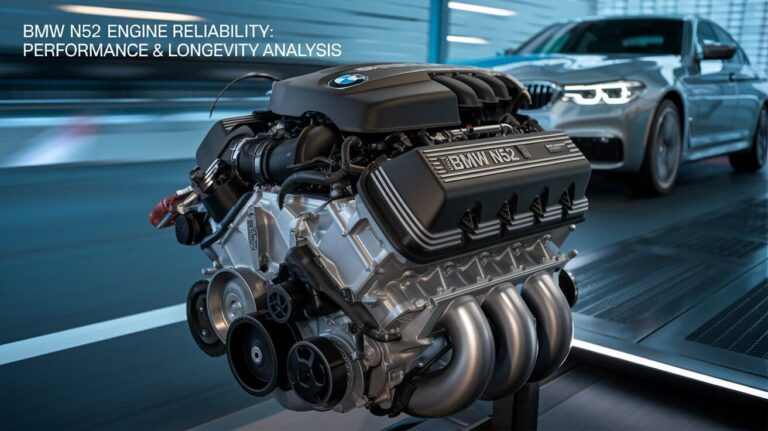
The BMW M4 combines German engineering prowess with high-end performance and luxury. But how well does it hold up over time? This article examines the M4’s reliability, spotlighting frequent problems, upkeep requirements, and what owners say after years behind the wheel.
The BMW M4: An Overview
BMW introduced the M4 in 2014 as the high-performance version of the 4 Series. It quickly became a favorite among driving enthusiasts for its powerful engine and sharp handling.
M4 Models and Generations
The M4 has seen two generations:
- First Generation (F82/F83): 2014-2020
- Second Generation (G82/G83): 2021-present
Both generations offer coupe and convertible options, with the latest models featuring increased power and advanced tech.
Key Features and Performance Specs
M4s pack a punch under the hood:
- First-gen: 3.0L twin-turbo inline-6, up to 454 hp
- Second-gen: 3.0L twin-turbo inline-6, up to 503 hp
These cars sprint from 0-60 mph in as little as 3.8 seconds, showcasing their performance pedigree.
Assessing BMW M4 Reliability
Reliability often tops the list of concerns for potential M4 buyers. Let’s break it down.
Common Issues and Concerns
While generally robust, M4s have a few known issues:
- Charge pipe failures (especially in tuned cars)
- Oil leaks from valve cover gaskets
- Carbon buildup in intake valves
- Occasional electrical gremlins
These problems aren’t universal, but they’re worth watching for.
Long-Term Durability Factors
Several factors influence M4 longevity:
- Driving style: Aggressive driving can wear components faster
- Maintenance: Regular upkeep is crucial
- Climate: Extreme weather can stress certain parts
Properly cared for, many M4s cruise past 100,000 miles without major issues.
Maintenance and Upkeep
Keeping an M4 in top shape requires attention to detail.
Scheduled Service Requirements
BMW recommends service intervals based on onboard computers. Typical maintenance includes:
- Oil changes: Every 10,000 miles or annually
- Brake fluid: Every 2 years
- Spark plugs: Every 60,000 miles
Following these guidelines helps prevent bigger problems down the road.
Preventative Care Tips
Smart M4 owners often:
- Use high-quality fuel and oil
- Let the engine warm up before hard driving
- Keep tires properly inflated
- Address small issues before they grow
These habits can significantly boost reliability.
Owner Experiences and Reviews
Real-world feedback offers valuable insights into M4 reliability.
Real-World Reliability Reports
Many owners report positive experiences:
- “75,000 miles and only routine maintenance so far.”
- “Rock solid after 5 years of daily driving.”
However, some face challenges:
- “Charge pipe blew at 30,000 miles during a track day.”
- “Electrical issues cropped up after 4 years.”
Comparison to Other BMW Models
M4s often fare better than some other BMW models in reliability surveys. They tend to avoid the chronic issues that plagued older M3 generations, like rod bearing failures.
Performance vs. Reliability Trade-offs
High-performance cars like the M4 walk a fine line between power and dependability.
Engineering Choices and Their Impact
BMW’s engineers make calculated decisions:
- Lightweight materials may sacrifice some durability
- High-strung engines push thermal limits
- Complex electronics improve performance but add potential failure points
These choices impact long-term reliability.
Balancing Power and Longevity
Owners can influence this balance:
- Stick to stock power levels for better longevity
- Upgrade cooling systems if increasing power
- Use high-quality parts for modifications
Striking the right balance keeps M4s running strong for years.
BMW M4 Reliability by Model Year
Reliability can vary across production years.
First Generation (F82/F83) Reliability
Early F82 models (2014-2016) had some teething issues:
- Charge pipe failures more common
- Some electrical quirks
Later years (2017-2020) saw improvements:
- Stronger charge pipes from the factory
- More refined electronics
Second Generation (G82/G83) Improvements
The latest M4s benefit from lessons learned:
- Upgraded cooling systems
- More robust electrical architecture
- Improved engine management software
While still new, early reports suggest enhanced reliability.
Cost of Ownership and Repairs
M4 ownership comes with premium costs.
Warranty Coverage and Extended Options
New M4s come with:
- 4-year/50,000-mile basic warranty
- 4-year/50,000-mile powertrain warranty
Extended warranties are available but pricey. They’re worth considering for long-term peace of mind.
Common Repair Expenses
Some typical repair costs:
- Charge pipe replacement: $500-$1000
- Valve cover gasket: $800-$1200
- Carbon cleaning: $500-$800
These costs underscore the importance of preventative maintenance.
Modifying the M4: Effects on Reliability
Many M4 owners can’t resist the urge to upgrade.
Popular Upgrades and Their Impacts
Common mods include:
- ECU tunes
- Aftermarket exhaust systems
- Upgraded intercoolers
While these can boost performance, they may stress components beyond factory specs.
Maintaining Reliability with Aftermarket Parts
Tips for reliable modding:
- Use reputable brands
- Install supporting mods (e.g., better cooling with more power)
- Adjust maintenance schedules for modified cars
Smart modding can enhance performance without sacrificing reliability.
Comparing M4 Reliability to Competitors
How does the M4 stack up against rivals?
M4 vs. Other German Performance Cars
Compared to Mercedes-AMG C63 and Audi RS5:
- M4 often rates similarly in reliability surveys
- All require attentive maintenance
- M4 might edge out in long-term durability
How the M4 Stacks Up Against Japanese Rivals
Lexus RC F and Nissan GT-R comparisons:
- Japanese competitors often have fewer reported issues
- M4 offers a different driving experience and brand cachet
- Long-term reliability gap may be narrowing with newer M4 models
Buying a Used BMW M4
The used market offers great M4 values, but buyers should be cautious.
What to Look for in a Pre-Owned M4
Key checkpoints:
- Comprehensive service history
- Signs of track use or abuse
- Warranty status
- Accident history
A well-maintained used M4 can be a smart purchase.
Red Flags and Inspection Tips
Watch out for:
- Excessive oil consumption
- Rough idle or misfires
- Suspension noises
- Transmission hesitation
Always get a pre-purchase inspection from a BMW specialist.
Future Outlook: BMW M4 Reliability Trends
What’s on the horizon for M4 reliability?
Technological Advancements and Reliability
Emerging tech might boost dependability:
- Advanced diagnostics systems
- More durable materials
- Improved manufacturing processes
These could lead to even more reliable future models.
Predictions for Upcoming M4 Models
Expectations for future M4s:
- Continued focus on performance
- Possible hybrid powertrains
- Enhanced durability to match increased complexity
The M4’s evolution promises exciting developments in both performance and reliability.
The BMW M4 delivers exciting performance and maintains good reliability. The car needs regular maintenance and may have some problems. Owners who take care of their M4s properly enjoy their cars long-term. The driving experience makes up for the required upkeep and attention.






